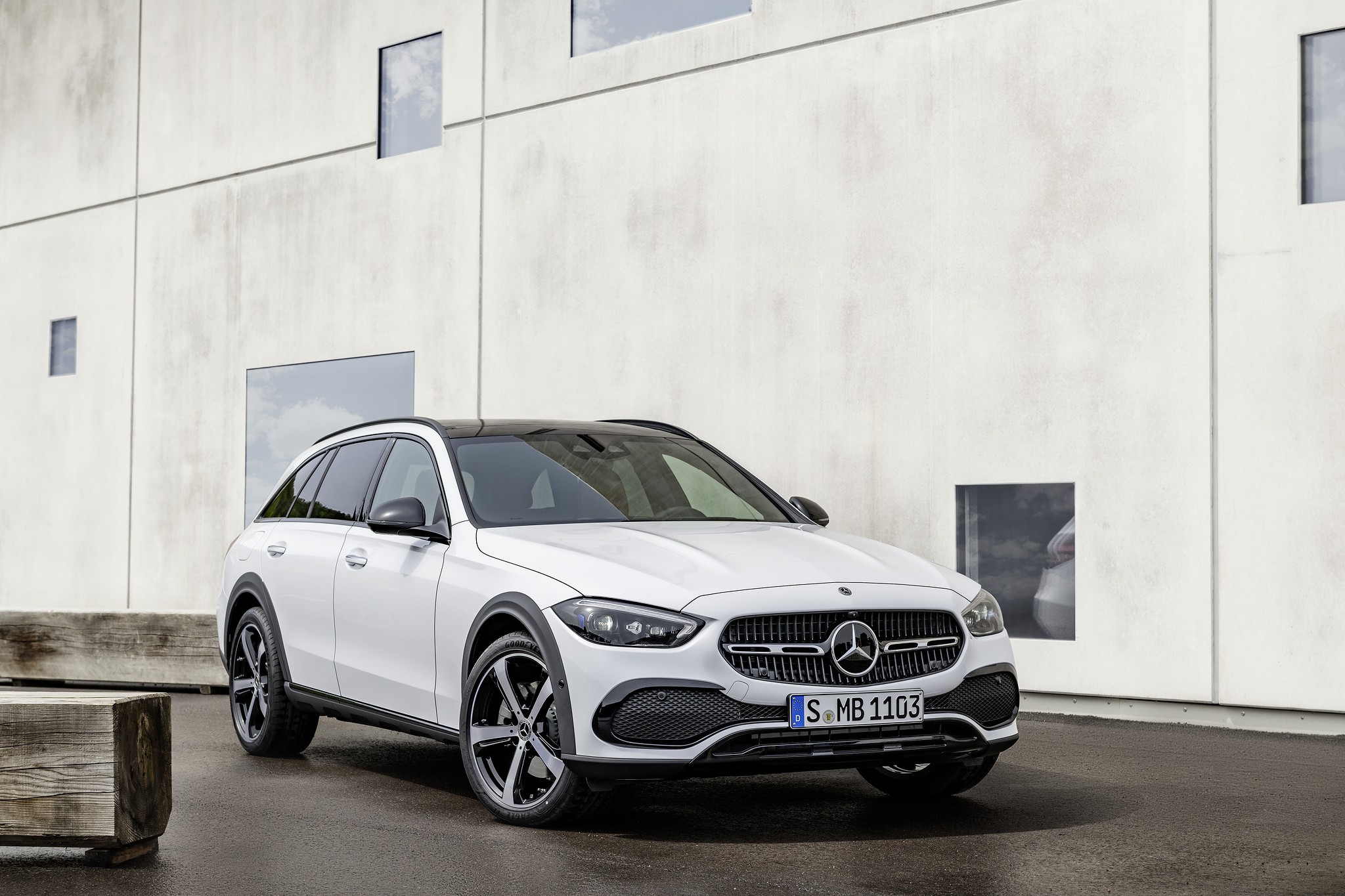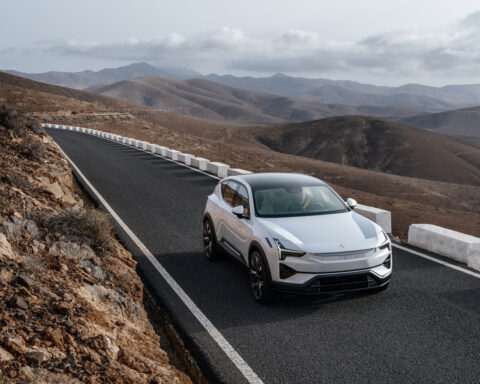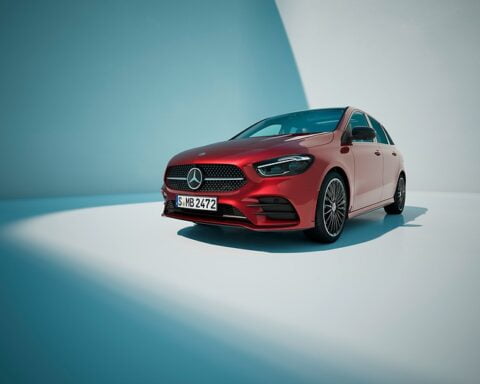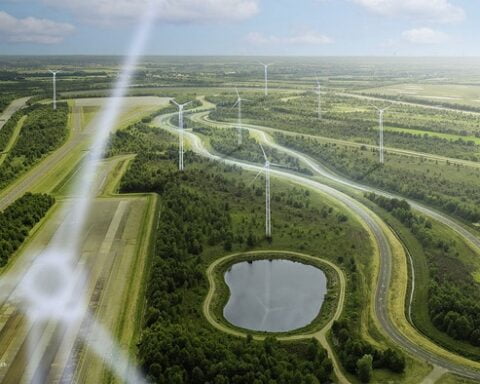Stuttgart. For those who find a conventional estate car less than suitable off-road, and an SUV too high-legged, Mercedes-Benz now offers an all-rounder as an alternative in the C-Class segment: the C-Class All-Terrain. Following the introduction of the successful All-Terrain concept with the E-Class in spring 2017, the C-Class is now also launching as a second multi-talent with a striking look and versatile capabilities.
With around 40 millimetres more ground clearance than the conventional C-Class Estate, 4MATIC all-wheel drive as standard and two off-road driving modes, the C-Class All-Terrain makes light work of light terrain such as unmetalled tracks with its larger wheels. The off-road design features include the distinctive radiator grille, the special bumpers, the simulated underride guard at the front and rear and the wheel arch linings in matt dark grey. In addition, the crossover model features many highlights of the just recently launched new C‑Class. These include efficient four-cylinder engines with 48-volt technology, the adaptive and intuitive MBUX (Mercedes-Benz User Experience) infotainment system, and the latest generation of driving assistance systems. DIGITAL LIGHT (optional equipment) includes a special off-road light. The C-Class All-Terrain will celebrate its world premiere at the International Motor Show in Munich in September, and will reach European dealers later this year.
“Over 10.5 million units of the C-Class sold since 1982 show how popular the C-Class is with our customers. And the new generation has also got off to an excellent start, with over 50,000 orders in just three months. With the C-Class All-Terrain, we are adding a new variant to our strong lineup in this successful segment, alongside the Saloon and Estate models,” says Britta Seeger, member of the Board of Management of Daimler AG and Mercedes-Benz AG, responsible for Sales.
Compared to the conventional C-Class Estate, the All-Terrain has slightly increased dimensions. It is four millimetres longer and measures 4755 millimetres in total. Because of the wheel arch linings, the width is increased by 21 millimetres to 1841 millimetres. The increased ground clearance of around 40 millimetres has also increased the vehicle height to 1494 millimetres. The standard tyre size is 225/55 R 17 on 7.5 J x 17 H2 ET 44.5 wheels, while 245/45 R 18 on 8 J x 18 H2 ET 41 wheels and 245/40 R 19 on 8 J x 19 H2 with an offset of 41 mm are available as options.
The capacity and variability of the load compartment remain the same: the sporty rear has a load capacity of 490 to 1510 litres. The rear seat backrest of the Estate model is 40:20:40 split-folding. The EASY-PACK tailgate included as standard can be conveniently opened or closed at the touch of a button, using the button on the ignition key, the switch in the driver’s door or the release handle on the tailgate.
Striking looks: design features to emphasise the off-road appearance
The single-louvre radiator grille with chrome-plated trim elements and embedded central star characterises the front. The vertically aligned bars in the radiator grille emphasise the perceived value with their high-gloss black finish. The distinctive front bumper is partly made of dark grey, grained plastic, which emphasises the robust character of this model. Underneath it is a simulated underride guard in high-gloss chrome.
This C-Class variant has wheel arch liners in matt dark grey on the front wing and on the rear side wall. The model-specific trim on the side skirts contrasts visually with the painted body surfaces in this colour and finish. An additional chrome trim strip is integrated into the side member trim. Exclusive wheel designs in sizes from 17 to 19 inches are available for the All-Terrain. At the rear, the newly designed multi-section bumper, the model-specific, chrome-plated load sill guard and the simulated underride guard underline the special nature of this vehicle.
As the All-Terrain models are based on the AVANTGARDE exterior, the waistline trim, side window surrounds and roof railings are finished in polished aluminium. The trim on the B-pillars and the bars on the rear side windows are in high-gloss black. If equipped with the Night Package, further features (e.g. E-line, waistline, outside mirrors) and trim elements at the front and rear (simulated underride guard at the front and rear, as well as the load sill protection) are in high-gloss black.
The AVANTGARDE interior is also standard for the All-Terrain. With black, macchiato beige / black and sienna brown / black, there are three colour concepts to choose from. The instrument panel features a silver chrome clasp and matt diamond silkscreen trim element (other finishes are available). The opulent trim area flows without interruption from the centre console into the instrument panel.
The instrument panel is slightly inclined towards the driver by six degrees. The high-resolution LCD screen in the driver’s area is free-standing and appears to float in front of the wing profile and trim panel. This sets the driver display apart from traditional cockpits with classic dial instruments. Customers have a choice between a 10.25-inch (26.0 cm) or a 12.3-inch (31.2 cm) version. A new “Offroad” context was designed for the All-Terrain. This holds specific information such as the incline, decline and steering angle. The geocoordinates and a compass are also displayed.
The seats with an AVANTGARDE-specific seat upholstery layout are another highlight. They ensure a high level of comfort and lateral support. The multifunction sports steering wheel in black leather with silver trim is visually attractive and allows a comfortable grip. The AVANTGARDE interior also includes ambient lighting.
For more demanding tasks: comfort suspension with around 40 mm more ground clearance
The All-Terrain has around 40 millimetres more ground clearance than the conventional C-Class Estate, and the wheels are larger in diameter: this makes the All-Terrain suitable for poor road surfaces. The four-link front suspension has slightly larger steering knuckles. A multi-link suspension mounted on a rear axle carrier is installed at the rear.
For balanced ride comfort and high driving stability, the comfort suspension with a passive damping system is standard for this model variant: the damping effect is adapted to the road surface, depending on the amplitude. In this case ride comfort is improved by reducing the damping effect, and when the shocks are more severe, the full damping action ensures more stability.
A question of character: DYNAMIC SELECT with off-road modes
In addition to ECO, COMFORT, SPORT and INDIVIDUAL, the All-Terrain has two further DYNAMIC SELECT modes for off-road driving: OFFROAD is designed for easy terrain such as dirt roads, gravel or sand; OFFROAD+ with DSR (Downhill Speed Regulation) is recommended for somewhat heavier and steeper terrain. DYNAMIC SELECT adapts the characteristics of the engine, transmission, steering, ESP® and 4MATIC. The driver can switch between the driving modes by touch input in the switch panel below the central display.
A broad impact: DIGITAL LIGHT including off-road light
The C-Class has LED High Performance headlamps as standard. The DIGITAL LIGHT system familiar from the new S-Class can be chosen as an optional extra. For the All-Terrain it includes a special off-road light. When driving on light terrain, wide illumination ensures that the driver can see obstacles sooner, even when cornering. As soon as the off-road driving mode is activated, the off-road light switches on. The function is active up to 50 km/h, and switches off automatically above this threshold.
DIGITAL LIGHT has a light module with three extremely powerful LEDs in each headlamp, whose light is refracted and directed by 1.3 million micro-mirrors. The resolution is therefore more than 2.6 million pixels per vehicle.
With this dynamic capability and precision, this system creates almost unlimited possibilities for a high-resolution light distribution that adapts outstandingly to the local conditions. However, the deciding factor is not only the technology in the headlamp, but rather the digital intelligence behind it. An onboard camera and sensor systems detect other road users. Powerful computers evaluate the data as well as digital maps in milliseconds, and give the headlamps their instructions to adjust the light distribution in all situations.
This revolutionary lighting technology can be expanded to include projection functions[1]. Optionally available ex works or online from the Mercedes-Benz Shop, these additional features are enabled via over-the-air (OTA) technology. This system can make driving safer by projecting guide lines, symbols and animations onto the road. For example, DIGITAL LIGHT projects two guide lines when encountering roadworks. These roughly delineate the vehicle’s width. The driver is therefore given even better guidance in the narrowed roadway. The intelligent technology highlights pedestrians in the danger zone with a spotlight function and clarifies their position with projected direction points. Drivers travelling against the prescribed direction on motorway slip roads or one-way streets are warned by a symbol. The same warning symbol appears before running red lights or stop signs.
Hooking up: trailer operation with clever assistants
With all-wheel drive as standard and a towing capacity of up to 1800 kilograms, the All-Terrain comes equipped for trailer operation. A partially electric trailer hitch with swivelling ball-head and ESP® trailer stabilisation is available as an optional extra. A button in the luggage compartment unlocks the trailer hitch. Then it can be folded out. The control light goes out when it is correctly engaged.
At speeds of 65 km/h or more, ESP® trailer stabilisation can intervene automatically in critical situations. When undesirable oscillations are detected, they are dampened with the help of alternating braking interventions at individual wheels. This is usually enough to reduce dangerous oscillations. If necessary, the system reduces the vehicle speed as well: this is done by reducing the engine torque and braking the vehicle at all four wheels.
A trailer manoeuvring assistant is available in conjunction with this optional extra, and with the Parking Package with 360° camera. It makes manoeuvring with the trailer easy, even for the inexperienced. The trailer manoeuvring assistant automatically regulates the steering angle of the towing vehicle up to a speed of 5 km/h, and up to a gradient of 15 percent.
The system is activated at standstill by selecting reverse gear and pressing the Park button to the left of the touchpad in the centre console.
The trailer manoeuvring assistant can be operated intuitively using MBUX: using the central display or the touchpad in the centre console, the driver only needs to indicate the desired manoeuvre. In this way, he/she can choose the angle of articulation at which the combination reverses. For the first time, this makes freely selectable cornering manoeuvres up to 90° possible. The steering is then automatically guided so that the angle is maintained. The driver can also opt for the “pull straight” function when the trailer is following the right direction and is to continue reversing straight ahead. The manoeuvring process can be followed from different camera perspectives. Dynamic guide lines show the trajectory, vehicle width and distance from recognised objects.
Steady forward thrust: latest-generation 4MATIC
More traction and driving stability, even on difficult surfaces, is provided by the 4MATIC all-wheel drive, which is standard for the All-Terrain. Up to 45 percent of the engine power flows to the front axle, with up to 55 percent to the rear axle. The desire for even greater efficiency and the nine-speed automatic transmission necessitated further development of the 4MATIC drive system.
The new front-axle drive allows higher torque levels to be transferred with an ideal axle load distribution for driving dynamics. Moreover, this has a significant weight advantage compared to the corresponding component in the preceding series – a contribution to CO2 reduction. The technicians were also able to reduce the friction losses in the new transfer case. It also has a closed oil circuit, and does not need any additional cooling measures.
Electrified: the engines
The All-Terrain is available with either a petrol or diesel engine. In the petrol model, a new four-cylinder petrol engine (M 254) with integrated second-generation starter-generator (ISG) is used. For a short time, the output of combustion engine can be electrically increased by up to 15 kW.
Thanks to recuperation and the possibility of “gliding” with the engine switched off, the petrol engine is very efficient. In the M 254, Mercedes-Benz has for the first time combined all the innovations of the modular engine family of four- and six-cylinder petrol and diesel units in a single engine. They include NANOSLIDE® cylinder coating, CONICSHAPE® cylinder honing (trumpet honing) and the exhaust aftertreatment system positioned directly at the engine. A new feature is the segmented charger with conjoined flow, a further development of the Twin Scroll technology, for an even more immediate charging response.
Even the diesel variant has a mild hybrid drive. Its four-cylinder engine (OM 654 M) comes with an integrated second-generation starter-generator and 48-volt electrical system. The diesel can also recuperate and glide with the engine switched off. Electrification allows the use of an electric refrigerant compressor for the air conditioning system.
Further strengths of the new C-Class generation
Passengers in the front and rear benefit from the moderately increased exterior dimensions of the new model generation. Compared to the predecessor, the elbow width has been increased by 22 mm for the driver and front passenger and by 15 mm for the rear passengers. There is 11 mm more headroom in the rear. The increased rear kneeroom of up to 35 mm makes travelling even more comfortable for rear-seat passengers.
In terms of digitality and high quality, the C-Class has taken another major step forward in the interior. The interior now has highlights such as the display and operating concept adopted from the new S-Class, with a sporty interpretation. This is accentuated by the driver-oriented layout: the instrument panel and central display are slightly inclined towards the driver by six degrees.
In the second-generation MBUX (Mercedes-Benz User Experience), the hardware and software have taken a big leap forward: brilliant images on the LCD screens make it easy to control vehicle and comfort functions. The driver and central display provide an aesthetic experience. The appearance of the screens can be individualised with a total of three display styles (Classic, Sporty, Discreet) as well as several modes.
In the “Classic” style, the driver is welcomed by a familiar display layout. The well-proven two-tube concept provides driver-relevant information with content alternating between the two round displays. “Sporty” is dominated by the colour red, with a dynamically designed central rev counter. In “Discreet” style, the content is reduced to what is essential. In addition, both screens can be adjusted to the seven colour themes of the ambient lighting. The result is an impressive colour experience in the interior.
Compared to the previous C-Class model series, the latest generation of the Driving Assistance Package has additional and advanced functions. These reduce driver workload in day-to-day situations, for more comfortable and safe driving. In the event of danger, the systems can help him/her to react to an impending collision in the most appropriate way. A new display concept in the driver’s display shows how the systems work.
The safety concept of the C-Class is based on an intelligently designed body with a particularly rigid passenger compartment and specially designed vehicle structures. In addition there is the interaction with the restraint systems: In the event of a serious accident, for example, seat belt tensioners and airbags can be activated to protect the occupants. With the help of numerous numerical simulations and real crash tests, the vehicle structure was designed to provide the best possible protection for the occupants in the event of an accident. In addition to the legal requirements, the vehicle design also took into account in-house test requirements and criteria for passive safety that have been derived from real accidents.
Improved massage comfort
The optional massage function of the front seats has been expanded to cover the entire back area: eight chambers in the backrest ensure an improved deep-tissue effect. A vibration massage is possible on the driver’s side. Four corresponding motors are integrated into the cushion for this purpose. For the first time, seat heating is available for the rear.
At the touch of a button or by voice command, the holistic “Fit & Healthy” approach of ENERGIZING Comfort provides a tangible experience of the different comfort systems in the S-Class, and features programs that group them into worlds of experience. At the same time, the system creates a matching atmosphere in the interior – for example, invigorating in case of fatigue or relaxing in case of an elevated stress level. The ENERGIZING COACH suggests an appropriate fitness or wellness program based on vehicle and trip data. It also factors the information about sleep quality and stress level into its intelligent algorithm if the driver has a suitable wearable.
The AIR-BALANCE Package provides an individual fragrance in the interior – in line with personal preference and mood. Thanks to refreshing ionisation and purifying filtration of the outside and inside air, it also contributes to improved air quality on board and an increased sense of well-being.
Updates over the air (OTA) can be used to keep various software components up to date. As soon as a new update from Mercedes-Benz is available, a message appears in MBUX. The update is downloaded and installed in the background. The user then has to agree explicitly to its activation again. To transfer the data, Mercedes-Benz relies on mobile communications technology and the communication module installed in the vehicle due to the high security standard.
[1] All projection functions depend upon local road traffic regulations, and are available to partial extents in the USA, EU, China and the Gulf States.






